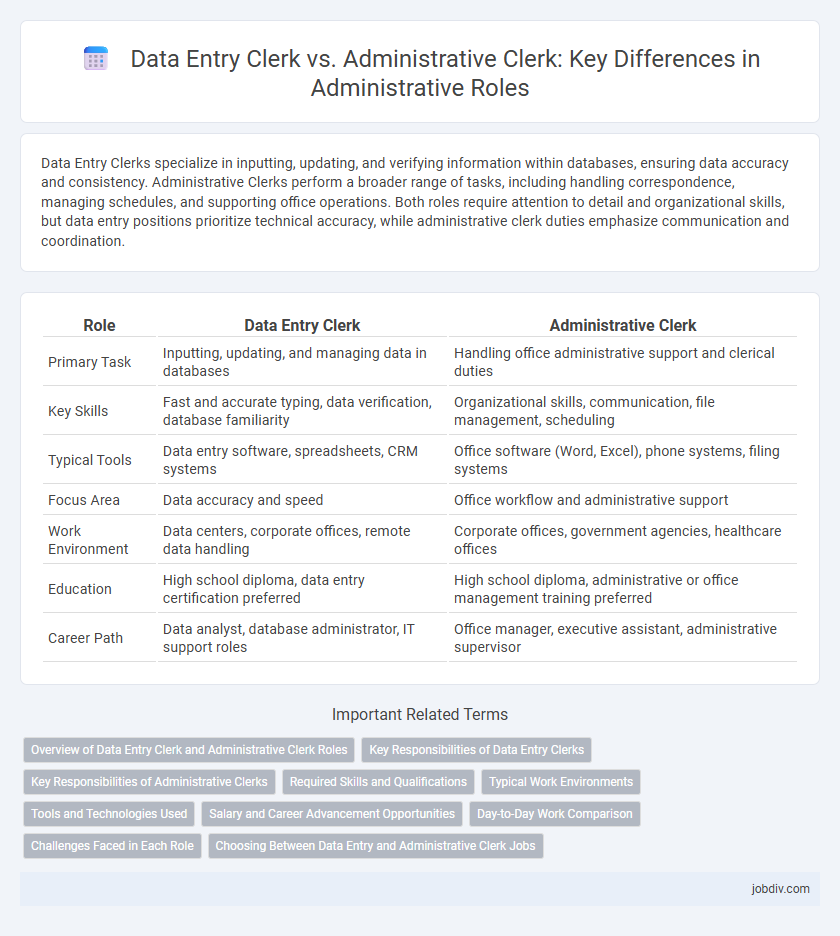Data Entry Clerks specialize in inputting, updating, and verifying information within databases, ensuring data accuracy and consistency. Administrative Clerks perform a broader range of tasks, including handling correspondence, managing schedules, and supporting office operations. Both roles require attention to detail and organizational skills, but data entry positions prioritize technical accuracy, while administrative clerk duties emphasize communication and coordination.
Table of Comparison
| Role | Data Entry Clerk | Administrative Clerk |
|---|---|---|
| Primary Task | Inputting, updating, and managing data in databases | Handling office administrative support and clerical duties |
| Key Skills | Fast and accurate typing, data verification, database familiarity | Organizational skills, communication, file management, scheduling |
| Typical Tools | Data entry software, spreadsheets, CRM systems | Office software (Word, Excel), phone systems, filing systems |
| Focus Area | Data accuracy and speed | Office workflow and administrative support |
| Work Environment | Data centers, corporate offices, remote data handling | Corporate offices, government agencies, healthcare offices |
| Education | High school diploma, data entry certification preferred | High school diploma, administrative or office management training preferred |
| Career Path | Data analyst, database administrator, IT support roles | Office manager, executive assistant, administrative supervisor |
Overview of Data Entry Clerk and Administrative Clerk Roles
Data Entry Clerks specialize in accurately inputting, updating, and managing data within electronic systems, emphasizing speed and precision to maintain database integrity. Administrative Clerks perform a broader range of office tasks, including scheduling, correspondence management, and document handling, supporting overall office operations and communication. Both roles are essential for organizational efficiency, with Data Entry Clerks focusing on data management and Administrative Clerks on general administrative support.
Key Responsibilities of Data Entry Clerks
Data Entry Clerks specialize in accurately inputting, updating, and maintaining information within computer systems or databases, ensuring high data integrity and confidentiality. Their key responsibilities include verifying source documents, correcting errors, and managing large volumes of information efficiently to support organizational operations. Unlike Administrative Clerks, who handle broader office tasks, Data Entry Clerks focus primarily on precise data processing and record management.
Key Responsibilities of Administrative Clerks
Administrative Clerks manage office operations by organizing files, maintaining records, and handling correspondence to ensure smooth workflow within the organization. Their key responsibilities include scheduling appointments, managing office supplies, and supporting other staff with clerical tasks such as preparing reports and processing invoices. Proficiency in office software and strong communication skills are essential for efficiently performing these duties and maintaining accurate administrative documentation.
Required Skills and Qualifications
Data Entry Clerks require proficiency in typing speed, accuracy, and familiarity with data management software like Microsoft Excel and database systems, emphasizing attention to detail and basic computer literacy. Administrative Clerks need strong organizational skills, knowledge of office procedures, effective communication abilities, and competence in using office software such as Microsoft Office Suite, alongside multitasking and customer service experience. Both roles benefit from foundational skills in time management and problem-solving but differ in technical software expertise and scope of responsibilities.
Typical Work Environments
Data Entry Clerks typically work in office settings, including corporate, healthcare, and government environments, where they handle high volumes of data input and management tasks. Administrative Clerks are found in diverse workplaces such as educational institutions, legal firms, and non-profit organizations, performing a mix of clerical duties like scheduling, correspondence, and file management. Both roles often require proficiency in office software and adherence to organizational data security protocols.
Tools and Technologies Used
Data Entry Clerks primarily use database software like Microsoft Excel, Google Sheets, and specialized data entry systems to input and manage information accurately. Administrative Clerks employ a broader range of office tools including word processing software such as Microsoft Word, email clients like Outlook, and scheduling applications to support daily office operations. Both roles increasingly integrate cloud-based platforms, automation tools, and electronic document management systems to enhance efficiency and data accuracy.
Salary and Career Advancement Opportunities
Data Entry Clerks in administration typically earn an average salary ranging from $28,000 to $40,000 annually, with limited career advancement opportunities often requiring additional skills or certifications. Administrative Clerks command a higher salary bracket, usually between $35,000 and $50,000 per year, benefiting from broader responsibilities that enhance promotion prospects to supervisory or specialist roles. Career growth for Administrative Clerks is supported by diverse administrative expertise, making them more competitive for managerial positions compared to Data Entry Clerks focused primarily on data input tasks.
Day-to-Day Work Comparison
Data Entry Clerks primarily focus on inputting, updating, and maintaining accurate digital records, emphasizing speed and precision in handling large volumes of data daily. Administrative Clerks manage a broader range of office tasks such as filing, scheduling, correspondence, and customer support, ensuring smooth office operations. Both roles require organizational skills, but Data Entry Clerks rely more on technical proficiency, while Administrative Clerks demand versatile administrative abilities.
Challenges Faced in Each Role
Data Entry Clerks face challenges such as maintaining high accuracy under repetitive tasks and managing large volumes of data within strict deadlines, often requiring advanced typing skills and attention to detail. Administrative Clerks encounter obstacles related to multitasking across diverse office duties including scheduling, correspondence, and record-keeping, demanding strong organizational and communication skills. Both roles require adaptability to evolving software systems and the ability to handle confidential information securely.
Choosing Between Data Entry and Administrative Clerk Jobs
Choosing between Data Entry Clerk and Administrative Clerk jobs depends on skill sets and job responsibilities. Data Entry Clerks specialize in accurate input and management of digital information, often requiring proficiency with data management software. Administrative Clerks handle broader office tasks including filing, scheduling, and communication, making adaptability and organizational skills essential.
Data Entry Clerk vs Administrative Clerk Infographic

 jobdiv.com
jobdiv.com